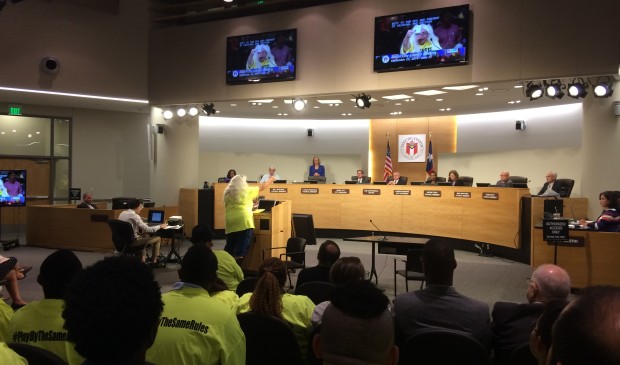Council OKs TNC regulations on first reading
Friday, September 26, 2014 by
Tyler Whitson Early Friday morning, Transportation Network Companies such as Lyft and Uber moved one step closer to operating legally on Austin streets as part of a temporary pilot program, provided they enter into an agreement with the city and follow a set of predetermined regulations.
City Council voted 6-1 to approve an ordinance on first reading, and will likely vote on it again at their next meeting. If approved, the ordinance will define TNCs, create a penalty for noncomplying TNCs and direct City Manager Marc Ott to enter into agreements with TNCs to allow their operation. Council Member Laura Morrison voted against the ordinance.
Council members had a lengthy discussion about insurance that led to two significant amendments. Council Member Chris Riley’s amendment clarified when the TNC’s commercial insurance policy takes over for drivers. Another amendment by Council Member Kathie Tovo clarified that, when the TNC’s insurance takes over, it be the primary policy for drivers and passengers.
Mayor Lee Leffingwell suggested that Council revisit any further legal discussions upon future readings.
Supporters of both TNCs and the traditional taxi industry flooded the Council meeting, demonstrating the two major sides of the debate. Taxi supporters wore bright yellow shirts reading “#PlayByTheRules,” while TNC supporters flaunted Uber and Lyft branded T-shirts.
A few Council members identified with concerns that taxi drivers would not be able to compete with TNCs under the pilot program. Morrison said that the city has a public interest in what the taxi industry provides, saying, “We can’t just go forward and let the taxi industry go out of business.”
Speakers supporting the ordinance listed a need for additional transportation in the city, especially for people who can’t drive their own vehicles or have been drinking.
Speakers opposed to the ordinance raised concerns about industry fairness, pricing, accessibility requirements and how the ordinance would relate to the distracted driving ordinance that Council passed in August, considering the role of electronic devices.
Morrison suggested that the right path forward would be to determine a way to merge the two industries, going to so far as suggesting that the ordinance also remove limits on the number of available taxi licenses.
Council Member Mike Martinez agreed. “Why are we handcuffing one industry and un-handcuffing another industry?” he asked. “If this is the road we’re going to head down, then it should apply to anyone that’s trying to earn a living in the transportation industry.”
Council Member Chris Riley, who sponsored the ordinance, said that the ordinance is part of a continuing conversation. “As that conversation goes on, I think it’s very important for us to recognize the reality of what’s happening and provide a safe and legal option to those who want to use these services and make use of the opportunity to inform the ongoing process.”
The ordinance concedes that there are “unanswered questions about how TNCs can meet the needs of those with disabilities who require specific vehicle types in order to be transported.”
As it stands now, it requires that TNCs pay a 10-cent surcharge for all rides originating in the city which will be “used to support the TNC’s riders who require ADA accommodations, with the goal of accessible rides being met with wait times similar to those of the rest of the rides.” Martinez said that how the surcharge is applied should be clarified on second and third readings.
The ordinance will give the city an opportunity to collect information about TNC operations in order to increase its understanding of transportation needs and how to address them.
The ordinance defines TNCs as organizations that provide “on-demand transportation services for compensation using an online-enabled application (app) or platform to connect passengers with drivers.”
The agreement is set to last for at least one year, though either party can cancel it at any time if either party fails to uphold its requirements, there is a public safety issue or Council amends the code to regulate TNCs.
You're a community leader
And we’re honored you look to us for serious, in-depth news. You know a strong community needs local and dedicated watchdog reporting. We’re here for you and that won’t change. Now will you take the powerful next step and support our nonprofit news organization?



